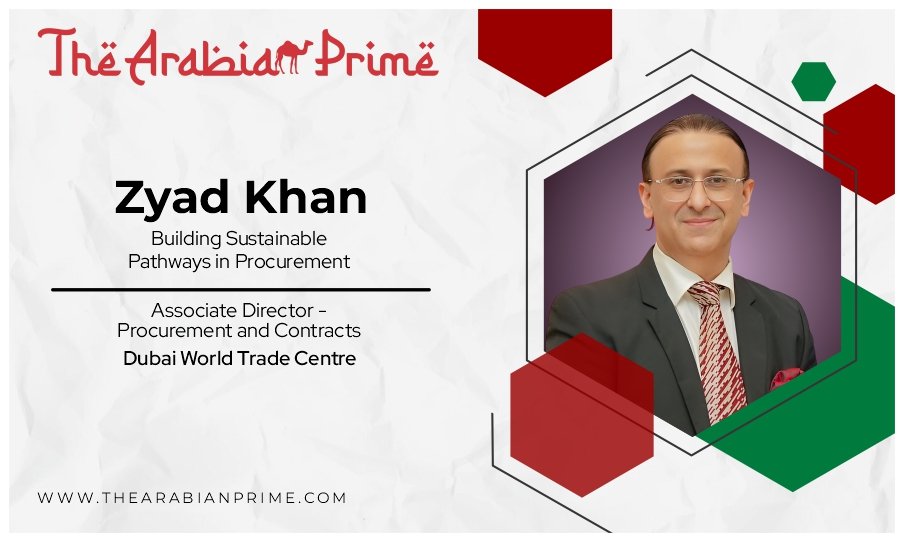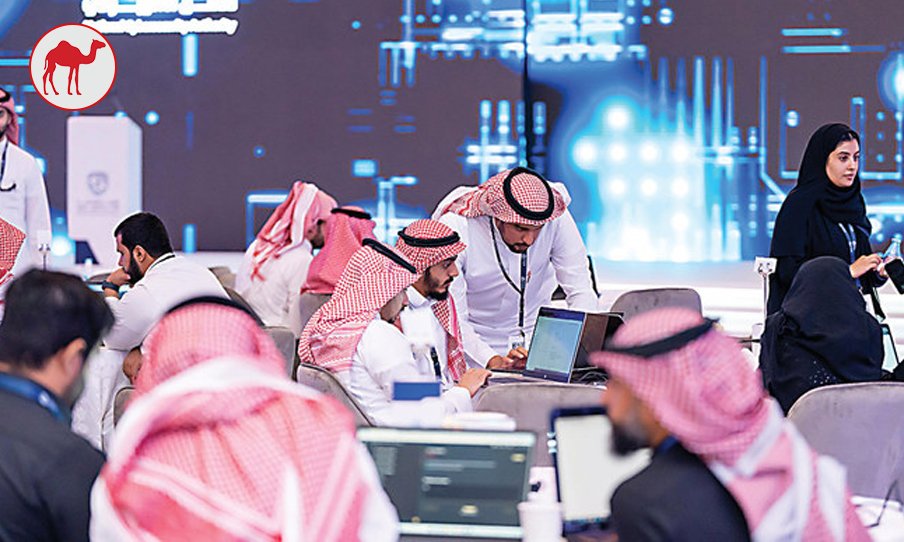Sep 4, 2025
Zyad Khan: Building Sustainable Pathways in Procurement

A leader forming procurement with vision, responsibility, and global impact!
Every great city has its hidden engines, the people who work behind the scenes to make growth possible and sustainable. In Dubai, where ambition meets scale, procurement plays a critical role in keeping that vision alive. Few understand this better than Zyad Khan, a procurement leader whose career has been defined by responsibility, foresight, and an unshakable belief in doing business with purpose.
With more than 25 years of experience across industries, Zyad has transformed procurement from a support function into a strategic driver of innovation and impact. His journey began with Emirates Airlines, where he introduced new sourcing strategies and achieved significant cost savings. Later, he took on vital responsibilities at the Private Office of the Ruler of Dubai, where decisions were not only about efficiency but also about creating long-term value.
Today, he leads procurement at Dubai World Trade Centre, guiding the complex MICE business while building a roadmap for sustainable sourcing. His vision aligns closely with Dubai’s Vision 2030, where growth must go hand in hand with responsibility. After delivering on major projects like Expo 2020 and COP28, Zyad continues to design procurement strategies that embrace sustainability, innovation, and resilience.
His expertise spans across hospitality, IT, facilities management, FMCG, and corporate procurement. Whether it is supplier relationship management, fleet optimization, or category management, he applies a wide-ranging knowledge base to optimize operations and build long-term value. Recently certified by UNITAR, he actively champions sourcing practices that align with the United Nations’ Sustainable Development Goals, ensuring procurement contributes to both progress and preservation.
Equally important is his role as a mentor and educator. At Heriot-Watt University, Zyad guides postgraduate students, preparing the next generation of procurement leaders. As a certified trainer, he has worked with ADNOC and DWTC cohorts, and his insights are often sought after at CIPS webinars and panel discussions.
From partnerships with global consulting firms to involvement in food security and In-Country Value projects, Zyad’s influence extends far beyond organizational walls. His work proves that procurement, when done with vision, can be a powerful force for cultivating industries and communities.
For Zyad Khan, procurement has never been just about transactions. It has always been about responsibility, impact, and the chance to build a future where growth and sustainability walk together.
Let us learn more about his journey:
A Career Defined by Curiosity and Growth in Procurement
The journey into procurement began almost by accident in the late 1990s within a retail setup back home. At that time, procurement was largely regarded as an administrative function, focused mainly on orders and compliance. Over time, growing complexity and rising stakeholder expectations started to reshape the role, making it far more dynamic than it once appeared.
This transformation became even more evident with a move to the UAE in the early 2000s, where the first role was taken up at Emirates Airlines. The unique and cross-functional nature of procurement created a deep sense of fascination. With the aim of broadening both category and sectoral exposure, there was a conscious decision to shift across industries. This included time with the Private Office of the Ruler, and for over a decade now, an impactful journey with DWTC.
Alongside professional growth, there was also a strong academic pursuit. The complete CIPS journey was undertaken, culminating in the achievement of fellowship (FCIPS). Today, this expertise is shared actively through mentoring upcoming professionals across different procurement and supply chain disciplines. A career that began unexpectedly has since evolved into one defined by purpose, learning, and guidance for the next generation.
Current Role and Responsibilities
For the past 12 years, Zyad has served as Associate Director of Procurement and Contracts, overseeing multiple spend categories at Dubai World Trade Centre (DWTC). As the leading exhibition and events venue in the Middle East, DWTC manages a vast spend portfolio across diverse business streams including facilities, hospitality, and experiential agencies.
The centre is home to some of the region’s most prominent flagship events such as Gulf Food, Gitex, Arab Health, the Dubai Airshow, and Formula 1, each drawing significant international participation and footfall. In addition to these, DWTC played a central role in managing dedicated pavilions during Expo 2020 and COP28, both high-profile events hosted in the UAE. These efforts were guided by a strong commitment to sustainability, reinforcing DWTC’s position as a trusted hub for global gatherings.
A Day in Your Life
In an event-driven space, unpredictability often comes as part of the package, with last-minute urgencies shaping the rhythm of the day. For Zyad, mornings begin at 8 a.m. with a much-needed coffee, setting the tone for a schedule that can extend until 8 p.m. With over a decade of experience, he has learned to build flexibility into his routine, safeguarding both mental and physical well-being while ensuring deliverables remain at the center of focus.
His workday is a blend of meetings that help review priorities, address exceptions, and create opportunities where leadership intervention can accelerate progress. At its core, the approach is about striking the right balance between time, value, and quality. By doing so, he empowers his team to grow their confidence and refine their decision-making abilities.
Lessons from the Pandemic
The pandemic revealed that resilience, risk foresight, and business continuity are not optional but foundational. It proved that agility can be achieved without disorder and transformed procurement into a trusted space of collaboration, where cross-functional initiatives improved contracts and strengthened recourse.
The shift was clear. The team moved from order-takers to value-makers, leading strategy from business disruption toward innovation. It also validated that business excellence must live off script when required, and that procurement, with its diverse perspective, rightfully deserves a place in the boardroom, far from the back office.
Examples from the airline and hospitality sectors after Covid reflected this contrast vividly. Businesses that had faced complete shutdowns during the crisis witnessed financial rebounds of unimaginable scale once operations resumed. These experiences underscored the enduring strength of adaptability and the power of collaborative foresight.
Challenges in Your Role
Balancing rapid business expectations, including ESG ambitions, with global supply risks and limited near-shoring maturity remains one of the core challenges. Rising costs, market volatility, and supplier constraints in adopting sustainability practices require proactive clarity at every step.
For Zyad, the principle of “bad news is good news” serves as a foundation, as early transparency prevents wasted effort and fosters stronger decision-making. His approach relies on the strength of data, scenario planning, and tiered risk visibility to navigate uncertainty with foresight.
Intentional buying that begins with “why” enables a shift in dialogue from price to purpose, ensuring risk management is embedded in each decision. To maintain alignment, Zyad conducts workshops with stakeholders, placing value goals at the center of collaboration. In addition, the role of rating agencies and third-party monitors provides continuous oversight, safeguarding delivery, compliance, and impact.
Through this structured and purposeful approach, he addresses challenges with a balance of clarity, alignment, and responsibility.
Technology and Tools in Supply Chain
The greatest opportunity for procurement today lies in leading technological transformation with discernment rather than succumbing to hype. Zyad and his team are currently piloting AI-based tail spend optimization and contract intelligence tools designed to extend human thinking rather than replace it.
According to Zyad, influence is achieved through intelligent use of technology rather than simple adoption. At times, pursuing a “do nothing” strategy proves more effective, where the focus is on maximizing existing systems, such as under-utilized ERP platforms in many organizations, before considering bespoke builds.
He emphasizes that procurement intelligence ensures there are no cost leakages and that every technological decision aligns with a clear purpose. In his view, technology should elevate strategic buying instead of creating unnecessary complications, especially in a landscape where costs must be carefully managed during constant transition.
Sustainability and Ethical Practices
Green procurement, according to Zyad, requires bold leadership and the willingness to hold difficult conversations with key vendors. Vendor resistance remains a challenge, yet this is addressed through regular awareness sessions that highlight the importance of sustainable practices.
Sustainability is embedded into the supplier evaluation and risk framework, not as a formality, but as a key performance factor that is further vetted by a rating agency. Every decision is made with accountability, where long-term sourcing value now extends to environmental and social capital.
For Zyad, intentionality is the driving force. Compliance alone cannot bring the needed change. The focus is on aligning present actions with the targets of 2030 and 2050. He believes that stakeholder trust is earned through responsible action that reflects a clear commitment to People and Planet.
Staying Updated with Trends
Technology is no longer just a tool, it has become a force multiplier and an extension of procurement intelligence. Zyad welcomes every demo and pitch from technology vendors and also relies on curated industry feeds, strategic peer forums, and hands-on pilots to stay ahead.
According to him, the best technology does not compete with buyers, it completes them by helping them focus on what truly matters within the decision-making rationale. He believes that technology on offer is only as good as the mindset behind it, and therefore, human judgment continues to steer the ship.
In his view, professionals who avoid technology risk falling behind those who embrace it and use it to become more impactful, value-driven buyers.
Essential Skills for Supply Chain Leaders
Today’s supply chain leaders require systems thinking, adaptive communication, and technological fluency. Success depends on balancing logic with empathy, foresight with flexibility, and the intelligent use of technology and data to remain agile in every situation. True influence comes from showing relevance rather than asserting rank, which means communication must always move forward into collaboration.
The path to growth lies in cultivating curiosity, questioning assumptions, and translating complexity into clarity. Leaders must remain anchored in purpose, as every decision and action contributes to the legacy that will guide Generation Z, the leaders of tomorrow. The role is less about holding every answer and more about framing the right questions, creating space for inclusive and informed decisions that shape a stronger future.
Future Trends in Supply Chain
The supply chain profession is set to witness a major shift in the coming years. The focus will move from cost control to co-creation of value, with transparency forming the foundation. Agile ecosystems, sustainable sourcing, and the use of data insights will lead this transformation.
Technology, from artificial intelligence to predictive analytics, will serve as an extension of procurement intelligence. Decision-making clarity will merge with strategies that drive organizations forward. Each decision will hold weight, judged not only by the savings achieved but also by the impact created through bold, technology-enabled, and value-driven choices.
Traditional tendering may lose relevance over time. Instead, strategic awards built around the destiny of partnerships will take precedence. The adoption of e-marketplaces, particularly in areas such as standardized and tail spend, will become a common approach for driving efficiency across industries.
Advice for Aspiring Professionals
The advice shared for those beginning a journey in supply chain management emphasizes starting as a listener rather than a controller weighed down by outdated compliance habits. Understanding the “Why” behind the “Buy” is seen as vital to balance risk with value, as proactive action will always outweigh reactive responses.
This field rewards passion, which is why technology must be embraced as a partner that enhances progress instead of being viewed as a threat. The guidance also highlights that rushing to be right should never be the goal. Instead, the aim must be to be heard and understood. Influence grows steadily through trust, purpose, and consistent delivery that looks at the whole picture.
Networking plays a central role in shaping careers, captured in the idea that a “Network is a Net worth.” Building meaningful connections, collaborating effectively, and complementing the strengths of others create opportunities that expand possibilities.
Leadership, in this view, drives innovation when it is rooted in humility, valuable insights, and a willingness to co-create the future rather than simply manage the present. These principles form a strong foundation for anyone who aspires to thrive in the field of supply chain management.
Misconceptions about Procurement and Supply Chain
A common misconception about procurement and supply chain is the perception of it as a cost-cutting function, often viewed as slow in delivery. In reality, it blends strategy, insights, and empathy, extending far beyond short-term objectives. The role is not that of a gatekeeper but an enabler, supported by strong risk mitigation strategies that allow businesses to remain sustainable.
From green procurement practices to building supplier partnerships, procurement creates clarity that prevents wasted effort. Yet, procurement rarely finds representation in company culture through newsletters or recognition platforms. It becomes the responsibility of professionals in this field to highlight commercial strategies that have reduced risks and unlocked untapped value.
The challenge lies in the lack of acknowledgment. Procurement is often blamed when issues arise, but its success in driving efficiency and value rarely receives the credit it deserves.
What People Should Know about Procurement and Supply Chain
Procurement today is far more than a function of deciding what to buy and in what quantity. It has evolved into a discipline that asks deeper questions: Why is a decision being made and what comes next. Technology has become an extension of human intelligence, and agility with clarity has replaced the old rigidity of policies and processes.
Procurement should be viewed as a strategic ally rather than a barrier. When practiced with the right intent, it fuels growth, protects the brand, and drives innovation through meaningful strategic relationships. It allows businesses to move with speed while making sound commercial decisions that are holistic in nature.
If end users begin to see procurement professionals as internal advisors, collaboration can take stronger and faster strides. This shift has the power to strengthen business sustainability and sharpen core competence, making procurement a true enabler of long-term success.
The Future of Procurement and Supply Chain
The future of procurement and supply chain is marked by an inspiring shift from conventional transactions to true transformation. What once revolved around tenders is now shaping into strategic partnerships. Procurement is steadily rewriting its identity, moving from the role of compliance checkers to becoming architects of impact.
This transformation is strengthened by technology that brings agility and accuracy, offering clarity in decision making. At the same time, green procurement has emerged as a global vision, demanding bold leadership. Procurement now holds a significant seat at the table, where critical organizational strategies are influenced by its input.
With technology as the enabler and ESG as the guiding compass, the field has both the tools and the mandate to lead with confidence. This redefined role positions procurement and supply chain as key drivers of sustainable and strategic growth.
Staying Motivated in Your Career
The dynamism of supply chains and the constant evolution of markets and trends serve as a strong source of motivation. The drive also comes from winning stakeholders and their budgets through the value demonstrated as a complete package, which has become Procurement’s newly discovered competitive edge.
Procurement is always moving forward, presenting fresh challenges that demand solutions. The ability to see Buyers transform challenges into opportunities and grow into value-makers provides immense inspiration.
At its core, Procurement is a people-driven field. True satisfaction comes from witnessing business growth that emerges through stakeholder collaboration labs, rather than being limited to traditional policy manuals. This collaboration and evolution continue to fuel motivation and purpose.




